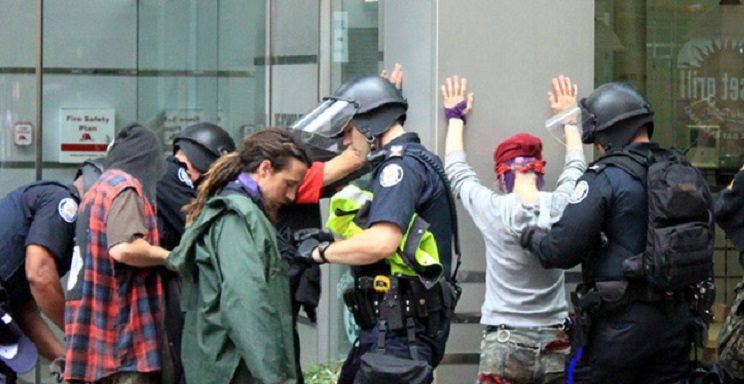[Author]Cops irate over proposed bill which would force them to adhere to Fourth Amendment
by Adan Salazar[/Author]
Members of the New York Police Department are rejecting a new proposal which would require them to inform citizens of their rights to refuse searches prior to unwarranted searches being conducted.
The bill, introduced today, forces police to obtain consent from citizens before they search them, a rule which was already pretty much established by the Fourth Amendment to the U.S. Constitution, which guarantees “The right of the people to be secure in their persons, houses, papers, and effects, against unreasonable searches and seizures…”
“The bill covers cases when police don’t have a warrant, are not making an arrest, or don’t have probable cause,” reports CBS New York.
Under the proposed bill, police would also be forced to obtain proof of a suspect’s consent, either in writing or with a recording of their verbal agreement.
A police union representative calls the new bill, which aims to keep citizens’ rights intact, a score for the criminals.
“This is one more time that the City Council is trying to protect criminals rather than New York City police officers,” Patrolmen’s Benevolent Association President Patrick Lynch told CBS New York.
New York City Mayor Bill de Blasio is also apparently still on the fence about whether or not protecting his fellow citizen’s rights is a good thing.
“We obviously have to protect the rights of our people, but we also have to make sure we are not undermining in any way for law enforcement to do its job,” de Blasio stated.
Evidently, police had grown accustomed to the lawless stop-and-frisk policies of the Mayor Michael Bloomberg era, which granted police broad search powers and which civil liberties organizations argued unfairly targeted minorities.
Last year, a New York judge ruled provisions of the “stop-and-frisk” law to be unconstitutional. That decision was echoed a few months later by a 2nd US circuit court of appeals which also found that searches were being carried out in a discriminatory, unconstitutional manner.
“Good idea,” an informed New York resident said of the new proposal, “because it protects our right to privacy by the First, Fourth and 14th Amendment.”
Other residents felt cops being required to uphold Fourth Amendment protections might hinder police work.
“If they ask, the answer is certainly gonna be, ‘No.’ So I don’t know what the point is,” a New Jersey resident stated.
Ironically the same officers who have no problem prodding into the affairs of innocent passersby fear their own privacy being violated.
In a recent poll conducted by pro-cop website PoliceOne.com, for example, police respondents said their biggest concern with body cameras was “A lack of privacy for the officers wearing them,” illustrating how police lift their own interests above the public’s.
The right of citizens to go about their business without the fear of being accosted by authority figures is one of the reasons the Founding Fathers included privacy protections in the Bill of Rights, whose Fourth Amendment states in full:
“The right of the people to be secure in their persons, houses, papers, and effects, against unreasonable searches and seizures, shall not be violated, and no Warrants shall issue, but upon probable cause, supported by Oath or affirmation, and particularly describing the place to be searched, and the persons or things to be seized.”
In other police related news:
Police claim minority report-style pre-crime program reduces crime rate
Officers struggle to shake dystopian sci-fi reputation surrounding crime software
by Mikael Thalen
Police in Modesto, California are attributing a recent crime drop to special software reminiscent of the Hollywood blockbuster “Minority Report.”
Predictive policing software, which utilizes mathematical algorithms often used in earthquake prediction, examines several years’ worth of crime and sociological data in order to predict where a crime will likely occur down to a 500-square-foot area.
According to Capt. Rick Armendariz, the software has brought crime down to a three-year low, despite less officers patrolling the streets due to budget cuts.
“It looks at our crime history the last 10 years using a mathematical equation and it gives us what we call a high probability of where the next crime is going to occur,” Armendariz told CBS Sacramento.
Armendariz believes the software is responsible for a drop in multiple crimes including burglaries, commercial theft and robberies.
Officers rely on a top 10 list produced by the software to give them insight into problem areas around the city.
“Telling our officers this is where you need to be at at those times,” Armendariz said.
While police hail the program as an effective crime fighting tool, local residents were not as quick to support the department’s findings.
“If you don’t take the reports, the crime stats go down,” one resident said on social media. “Try reporting a minor theft in Modesto and see what I mean.”
“Just like the one gentleman said, if it’s not reported of course crime will drop. No PDs do. So then less reports=less crime. Funny how they’re giving the PD credit when all they’re doing is less work…”
Others feel the software could begin targeting individuals, leading to false positives and potentially dangerous situations.
Just like Modesto, nearly every department in possession of such software was able to obtain it through federal grants.
Earlier this year, two departments in Washington state publicly announced their acquisition of the PredPol predictive policing software.
With big data collection becoming increasingly unpopular due to revelations surrounding the NSA, fewer and fewer Americans are trusting public servants to use the technology responsibly, especially including police given their illegal activities with Stingrays cell phone interceptors. Infowars.



